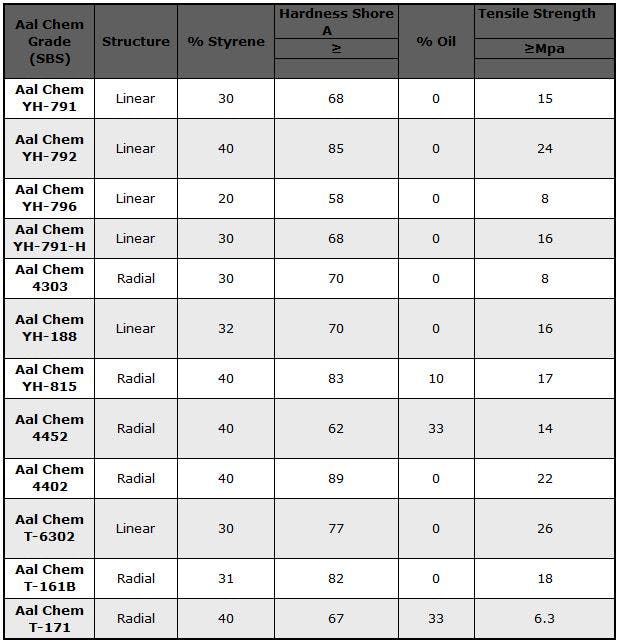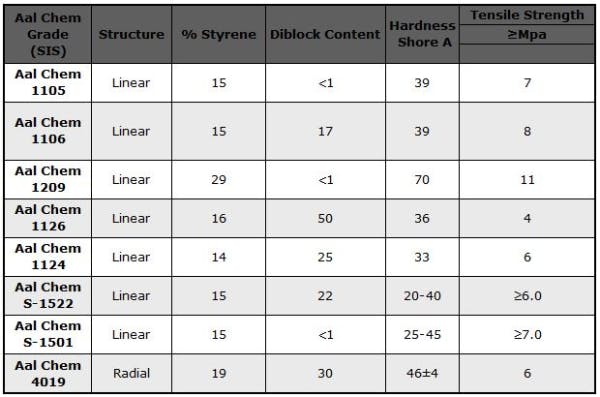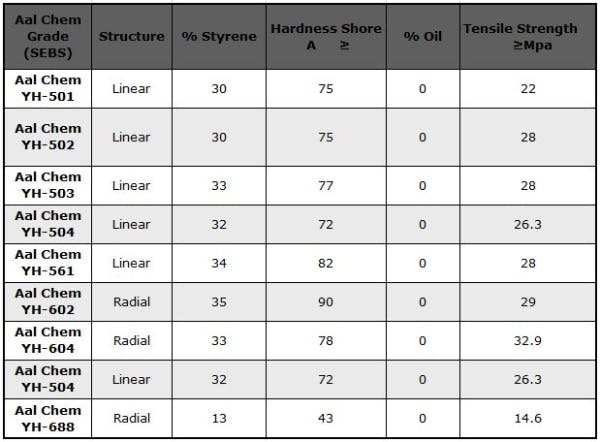7/13/2013
Ideal for use in adhesive, sealant, and coating applications, our new line of Styrene Block Copolymers are the perfect complement to Aal Chem’s existing product lines. Styrene Block Copolymers (SBCs) are a new manufacturing material that is changing the way some industries choose to do business. They are the largest (in terms of sales volume with over 1,200,000 metric tons consumed annually) and one of the lowest priced types of what are known as Thermoplastic Elastomers or TE’s. These unique products have the physical properties of rubber, but though the same system process of thermoplastics.
With SBC’s unique physical properties, they act similar to rubber, through the same system process of thermoplastics. The molecular structure of an SBC is made up of three blocks consisting of two harder polystyrene blocks on either end and one more malleable elastomeric block between them. When a high temperature has been achieved, the polystyrene disintegrates in such a way that the SBCs then can be processed as thermoplasts are. These characteristics allow SBCs to be melted down and remolded if necessary. The ability to melt and reform the SBCs allows the manufacturer to increase recycling of "scrap" product and minimize waste.
The reduced waste and manufacturing process around SBCs also allows them to qualify as an "environmentally green" product. In addition to the cost savings of having little waste, there is a huge social benefit of using SBCs in the manufacturing process. Many industrial companies are making the transition to styrene block copolymers simply due to the social pressure of trying to find more economical ways to produce their products.
If you’re interested in a quote, samples or literature, please make a request on one of our contact forms.
Types And Applications of Styrene Block Copolymers
There are three major types of SBCs including:
1. Poly(styrene-butadiene-styrene) (SBS)
2. Poly(styrene-isoprene-styrene) (SIS)
3. Poly(styrene-ethylene/butylene-styrene) (SEBS)
Styrene-butadiene-styrene or SBS block copolymers are used primarily for their compounding and adhesive qualities. Along with a recent increase in popularity for use as an element within modified asphalts, these are also used for roadways and the roofing portions of construction projects.

Styrene-isoprene-styrene or SIS block copolymers are popular primarily due to their combination of unique attributes. This includes exceptional strength, minimal viscosity and minimal hardness for less complicated processing. Their best uses are found in the creation of adhesives with pressure sensitivity, adhesives whose process require heat and melting to properly function and roadmarking, among other uses.

Styrene-ethylene/butylene-styrene or SEBS block copolymers, unlike their molecular cousins, find a great deal of use in the medical field. Today, SEBS find the majority of their medical use in applications such as tubing for peristaltic pumps along with uses in vaccine and pharmaceutical manufacturing where fluid transfer is necessary. The latest uses of SEBS in the medical field find them replacing flexible PVC in numerous applications.

The three different classes of SBCs have different strengths and thus different uses. SBS and SIS are soft and flexible with superior tack and adhesive properties. Naturally, they tend to find themselves being used in adhesives, sealants, and bitumen modification applications. They are also used in footwear because of the softness and efficient cost of these copolymers. While SEBS can be found in adhesives and sealants as well, what sets them apart is their weatherability and UV resistance. Thus, SEBS tend to be used in more durable applications.
Thus far, SBCs have primarily been thought of in industrial and manufacturing applications, but the technology has evolved beyond that. K Resin is the most recent advance in the industry. K Resin has the benefit of many SBC properties, but is also transparent and has a resistance to high impacts. The potential of k resin is being explored in food packaging, medical applications, toys, and household appliances.
Other potential uses for SBCs include: additives in motor oils, road and roofing sealants, construction materials, and personal hygiene.The grades of these types of polymers depends largely upon their use as regular production grade; SBCs do not require the same level of quality or quality control that medical grade SBCs do. Overall, as the uses of SBCs expand, so does their popularity and sales volume.
As the market for SBCs expands, one of the largest players in North America is the medical profession. For both health and environmental reasons, medical facilities are replacing outdated PVC-based equipment for SBC-based technology.
With such diverse properties and a wide range of applications, it seems that the popularity and demand of Styrene Block Copolymers will remain stable. The market is expected to continue to expand at a steady rate between 2010-2015. The total consumption is anticipated to rise between 4-5% each year with forecasts beyond 2015 being impossible to predict.
If you’re interested in a quote, samples or literature on our new line of our new line of Styrene Block Copolymers, please make a request on one of our contact forms.